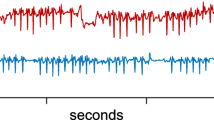Abstract
We introduce a method for finding temporal and atemporal relations in nominal, causal data. This method searches for relations among variables that characterize the behavior of a single system. Data are gathered from variables of the system, and used to discover relations among the variables. In general, such rules could be causal or acausal. We formally characterize the problem and introduce RFCT, a hybrid tool based on the C4.5 classification software. By performing appropriate preprocessing and postprocessing, RFCT extends C4.5’s domain of applicability to the unsupervised discovery of temporal relations among temporally ordered nominal data.
Access this chapter
Tax calculation will be finalised at checkout
Purchases are for personal use only
Preview
Unable to display preview. Download preview PDF.
Similar content being viewed by others
References
Bowes, J., Neufeld, E., Greer, J. E., Cooke, J., A Comparison of Association Rule Discovery and Bayesian Network Causal Inference Algorithms to Discover Relationships in Discrete Data, Proceedings of the Thirteenth Canadian Artificial Intelligence Conference (AI’2000), Montreal, Canada, 2000.
Freedman, D., Humphreys, P., Are There Algorithms that Discover Causal Structure?, Technical Report 514, Department of Statistics, University of California at Berkeley, 1998.
Heckerman, D., A Bayesian Approach to Learning Causal Networks, Microsoft Technical Report MSR-TR-95-04, Microsoft Corporation, May 1995.
Humphreys, P., Freedman, D., The Grand Leap, British Journal of the Philosophy of Science 47, pp. 113–123, 1996.
Karimi, K. and Hamilton, H.J., Finding Temporal Relations: Causal Bayesian Networks vs. C4.5, The Twelfth International Symposium on Methodologies for Intelligent Systems (ISMIS’2000), Charlotte, NC, USA, October 2000.
Karimi, K., Hamilton, H.J., Learning With C4.5 in a Situation Calculus Domain, The Twentieth SGES International Conference on Knowledge Based Systems and Applied Artificial Intelligence (ES2000), Cambridge, UK, December 2000.
Karimi, K., Hamilton, H.J., Logical Decision Rules: Teaching C4.5 to Speak Prolog, The Second International Conference on Intelligent Data Engineering and Automated Learning (IDEAL 2000), Hong Kong, December 2000.
Kennett, R.J., Korb, K.B., Nicholson, A.E., Seabreeze Prediction Using Bayesian Networks: A Case Study, Proc. Fifth Pacific-Asia Conference on Knowledge Discovery and Data Mining (PAKDD’01). Hong Kong, April 2001.
Karimi, K., Hamilton, H.J., RFCT: An Association-Based Causality Miner, The Fifteenth Canadian Conference on Artificial Intelligence (AI’2002), Calgary, Alberta, Canada, May 2002.
Korb, K. B., Wallace, C. S., In Search of Philosopher’s Stone: Remarks on Humphreys and Freedman’s Critique of Causal Discovery, British Journal of the Philosophy of Science 48, pp. 543–553, 1997.
Pearl, J., Causality: Models, Reasoning, and Inference, Cambridge University Press. 2000.
Quinlan, J. R., C4.5: Programs for Machine Learning, Morgan Kaufmann, 1993.
Scheines, R., Spirtes, P., Glymour, C. and Meek, C., Tetrad II: Tools for Causal Modeling, Lawrence Erlbaum Associates, Hillsdale, NJ, 1994.
Silverstein, C., Brin, S., Motwani, R., Ullman, J., Scalable Techniques for Mining Causal Structures, Proceedings of the 24th VLDB Conference, pp. 594–605, New York, USA, 1998.
Spirtes, P., Scheines, R., Reply to Freedman, In McKim, V. and Turner, S. (editors), Causality in Crisis, University of Notre Dame Press, pp. 163–176, 1997.
Wallace, C. S., Korb, K. B., Learning Linear Causal Models by MML Sampling, Causal Models and Intelligent Data Management, Springer-Verlag, 1999.
Author information
Authors and Affiliations
Editor information
Editors and Affiliations
Rights and permissions
Copyright information
© 2002 Springer-Verlag Berlin Heidelberg
About this paper
Cite this paper
Karimi, K., Hamilton, H.J. (2002). Discovering Temporal Rules from Temporally Ordered Data. In: Yin, H., Allinson, N., Freeman, R., Keane, J., Hubbard, S. (eds) Intelligent Data Engineering and Automated Learning — IDEAL 2002. IDEAL 2002. Lecture Notes in Computer Science, vol 2412. Springer, Berlin, Heidelberg. https://doi.org/10.1007/3-540-45675-9_5
Download citation
DOI: https://doi.org/10.1007/3-540-45675-9_5
Published:
Publisher Name: Springer, Berlin, Heidelberg
Print ISBN: 978-3-540-44025-3
Online ISBN: 978-3-540-45675-9
eBook Packages: Springer Book Archive




